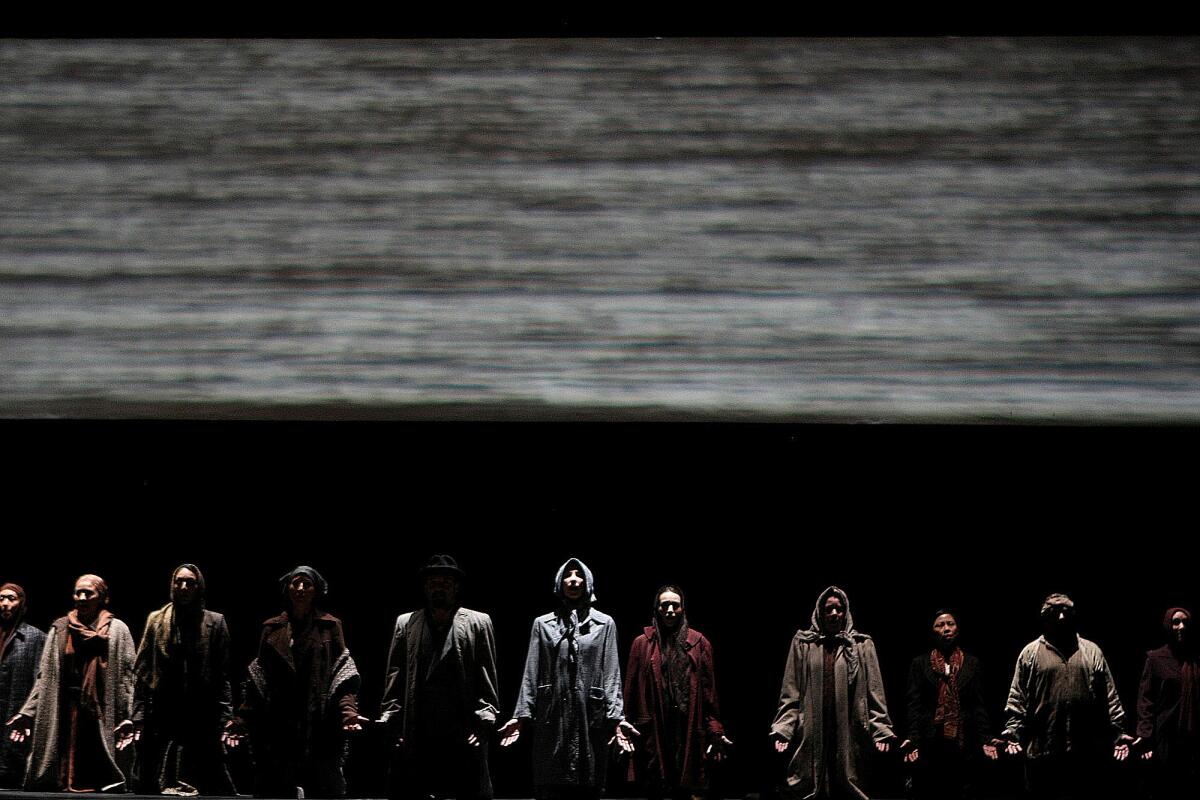Three Black artists resign from Long Beach Opera, citing ‘culture of misogyny,’ ‘racial tokenism’

Three Black staff members of Long Beach Opera have resigned from the company, citing a “culture of misogyny” and “racial tokenism,” among other issues, according to a letter obtained by The Times and posted online Tuesday.
Minister of culture Alexander Gedeon, associate artistic director Derrell Acon and education manager Elijah Cineas submitted their letter to the Long Beach Opera’s board of directors in December. Their letter was first seen publicly on Tuesday in a Facebook post by the Black Opera Alliance, which states its mission as empowering “Black classical artists and administrators by exposing systems of racial inequity and under-representation of the African diaspora in all facets of the industry and challenging institutions to implement drastic reform.”
The public posting of the letter follows the LBO’s announcement Monday that it had cancelled “Stimmung,” its first show of the 2022 season, which was set to open this weekend. In a lengthy online statement, the organization wrote that the cancellation was precipitated by the formal resignation of the show’s director, Gedeon, and that he was part of a group of staff members who had resigned in December.
The resignations had been post-dated to specific productions slated to run in 2022, in order to allow the resigning members time to complete the artistic work they had signed on to do. But in a personal statement he posted Tuesday on Facebook, Gedeon made clear that he felt the situation had become untenable and that had catalyzed his decision to leave a little more than a week before the show was scheduled to open March 19.
At the time of “Stimmung’s” cancellation, LBO revealed it was in the midst of an investigation into the allegations made in the resignation letter, including “an environment where women are marginalized, silenced, and devalued,” and racial tokenism, which the letter says are indicative of larger issues, including “a lack of the required skills and commitment to devise a cohesive leadership model, and a lack of initiative to authentically share power in the leadership structure.”
LBO said it would present the results of its investigation to the public in a few weeks. The organization also said it had hired an independent HR firm to address staff issues, as well as a mediator who began meeting with members of the artistic staff in January.
Neither LBO nor the resignation letter provided specific examples of the alleged toxic environment. In his personal statement, Gedeon wrote: “We demanded a robust response to address these glaring issues at the company and an assurance that other artists coming to work for the season would not be exposed to similar harm. While the board opened an investigation and interviewed some of the people who had been impacted by harm at the company, the leadership team did not officially recognize the letter, and the red flags contained therein, for six weeks.”
A spokesperson for LBO told The Times that “LBO represents a diverse array of artists and collaborators. The staff and the board took the concerns raised extremely seriously, since they are entirely at odds with the values each of us individually holds dear.”
Gedeon also wrote that he had notified the “Stimmung” team of his imminent resignation and his desire to seek public accountability before the beginning of rehearsals. A week ago, however, he said that several members of the production told him that they felt he was enabling behavior similar to what he had condemned in his resignation letter.
“The notion that I would be perpetuating the same culture which I surrendered my job for was devastating,” Gedeon wrote in his post. “I was also squarely questioned as to whether I could effectively lead while pursuing this public action at the same time. At this moment of reckoning, I saw that I was unwittingly perpetuating more harm, by both seeking accountability from the company during the production and struggling to mount a show in a high-pressured, unsafe environment at the same time.”
The “unsafe” environment Gedeon refers to in his statement is addressed in the December resignation letter, which states: “When a company does not rigorously and methodically seek out people of color when filling every leadership position as a matter of company policy, then elevates — and outwardly celebrates —people of color as leaders, but inwardly does not authentically integrate them into a leadership structure, it is not just tokenism, it’s white supremacy in action.”
The letter also alleges that the organization had fostered “an environment where the work of women is not honored by upper leadership.”
Specific instances of alleged misogyny at the company are not listed in the letter, which instead offers a variety of statistics: “Two years ago, women comprised 60% and individuals of color comprised 50% of the small staff. Since then, of the 12 employees who will have exited the company, six (or 50%) are women and seven (or 58%) are Black, Indigenous, and People of Color (BIPOC). The last six major hires for the company have all been white men. The company is poised to have an all-white (or white-presenting), overwhelmingly male staff by summer.”
LBO’s current leadership is helmed by General Director and Chief Executive Jennifer Rivera; with James Darrah serving as artistic director and chief creative officer; and Christopher Rountree as music director. Resigning member Acon previously served as the company’s director of equity and engagement before becoming associate artistic director. Darrah was hired into his current position in February 2021.
In a statement emailed to The Times, a LBO spokesperson responded to the allegations made public in the resignation letter. “Because LBO has a staff of only 7-10 people at any given moment, and because small non-profit organizations tend to have a good deal of turnover, the overall percentages of demographics within our organization have always shifted considerably with the departure of just one or two employees, despite our commitment to creating opportunities for diverse candidates for every open position.
“Currently our staff consists of 8 employees and 3 are women. We have not yet had an opportunity to hire replacements for those who have resigned. In terms of artists we have hired this season, LBO has contracted, or is in the process of contracting, a total of 49 artists, of which 35 (or 71%) are BIPOC.”
The additional allegations are all part of an ongoing investigation, the LBO statement reads, “but we believe some of them to be misleading, lacking context, or not based in fact.”
The Times has been unable to reach Cineas, and Acon did not respond to a request for comment by the time of publication. Gedeon declined to comment for the time being beyond his personal statement. In his Facebook post, he expressed optimism for the future of “Stimmung.”
“My hope is to find a path forward for STIMMUNG once the smoke clears. I started working with LBO in the summer of 2020, at a time when I was questioning whether there was actually room for my voice in opera culture,” he wrote. “Joining the company and working with Derrell Acon gave me tremendous hope that we could collectively push the operatic art form forward with a deeper sense of social purpose, and a sense of belonging.”
More to Read
The biggest entertainment stories
Get our big stories about Hollywood, film, television, music, arts, culture and more right in your inbox as soon as they publish.
You may occasionally receive promotional content from the Los Angeles Times.











